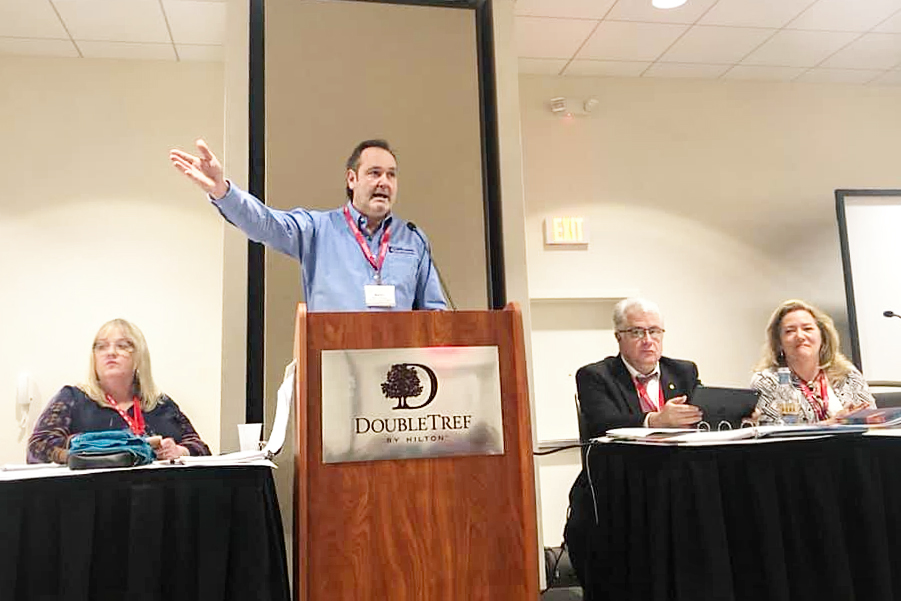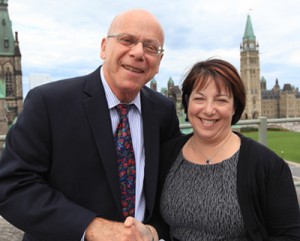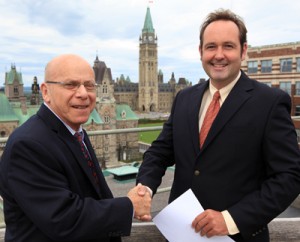|

ELECT MARTIN O’HANLON: DIRECTOR, CWA/SCA CANADA
Dear friends,
The last few years have been among the most difficult ever on the labour movement and the media industry. But while some have reacted with worry and woe, the leadership of your national union – CWA/SCA Canada – has responded with energy and innovation.
Since January, we have launched some of the most exciting projects in our history. With the continuing challenges ahead, it’s critical that we have an innovative, common-sense leader with the experience and skills necessary to run a complex union and keep us moving forward.
As Deputy Director of the union for the last seven years, a national and local leader for two decades, and a founding leader of the union in 1995, I know the initiatives we have in place and I have a clear vision for the future.
With the retirement of Arnold Amber, I’m running for the position of Director and I humbly ask for your support so that together, we can build the most dynamic, progressive union in the country.
My guiding principle as a leader is simple: do what’s best for the members. I have always served in a volunteer capacity, balancing union duties with long work hours and family life. My full-time job is parliamentary editor for The Canadian Press in Ottawa, directing a team of some of the finest political journalists in Canada.
In both my journalistic and union roles, I have championed progressive ideas, positive solutions – and action. For example, while many people are lamenting the decline of print journalism and saying that something should be done about it, we’re actually doing something. Right now.
A few months back, I proposed and began developing a pilot project for Kingston – a community-based, public-awareness campaign aimed at pressuring Quebecor to improve local news coverage and protect local jobs at the Whig-Standard. After countless meetings, conference calls and emails, I’m thrilled to say the project launched today and is already drawing a lot of attention. The plan is to use what we’ve learned from Kingston and take the campaign to other communities.
As we work proactively to defend journalism and save jobs, it’s also important that we help members when we lose the battle to protect them from layoffs. I’m proud to have initiated the education/training subsidy which has aided many of our laid-off colleagues with the cost of study courses and retraining. It does a little bit to help them get back on their feet, and – more importantly – it shows that we care.
While I’ve mentioned two of my recent initiatives, other leaders have put forward great ideas and most of our projects are team efforts. I have collaborated on or strongly backed other key developments, including the hiring of a full-time organizing director, and a first-of-its-kind alliance with an agency that represents freelance journalists.
As director, I would build on these developments to grow the union. At the same time, I’m deeply committed to our core function of serving members and I would uphold our proud tradition of ensuring that every member and Local gets what they need – from legal funding to rep support.
Here are some priorities I would like to move forward with in the next year:
* Organizing: Revitalize our organizing program and pour in as many resources as possible to grow the union, bring the benefits of unionism to more workers, and reinvigorate the labour movement.
* New activists/leaders: Quickly establish a strategy for using education, training and other means to get more members involved (especially younger ones) and build the next generation of leadership.
* Education: Establish a formal education program on the national level with semi-annual education/training seminars or courses.
* Communication: Build on recent efforts to improve the flow of union information to members. Improve external communications to establish CWA/SCA Canada as the "Go-To" union for labour issues.
* Public Broadcasting: The recent election of the majority federal Conservative government raises the serious possibility of cuts to CBC funding. A Tory government in Ontario could be equally threatening to TVO. I passionately believe in the importance of public broadcasting and will work with the CMG leadership on implementing a plan as soon as possible to head off any cuts.
* Diversity: Work with Diversity v.p. Ing Wong-Ward and Locals to develop a plan to reach out better to members and prospective members from diverse backgrounds to make the union inclusive and more representative of our membership.
* The Way Ahead: Renew and reinvigorate "The Way Ahead" project – the blueprint for growing the union – which has spawned some of our most innovative initiatives.
* Balanced budgets: Work with the Finance and Executive committees to ensure a balanced budget each year.
I truly believe we can build CWA/SCA Canada into a great force for good in this country and I hope you will support me in the cause.
Thanks to all who have written and phoned with kind words and expressions of support. Please don’t hesitate to call or email if you have any questions or just want to chat. You can also check out my Facebook page: Elect Martin O’Hanlon For Director CWA/SCA Canada.
All the best,
Martin O’Hanlon
Deputy Director, CWA/SCA Canada
(613) 867-5090 |

For the first time in this union’s history, the 9,000 members of CWA/SCA Canada have a choice and a voice.
In the past, our director was determined by the National Representative Council, and the current director, Arnold Amber, has held the post since 1995. Individual members had no say in choosing its best representative.
With the communication industry facing rapid change and complex challenges as the digital world becomes more intrenched in everyone’s life and businesses exploit new technologies to reduce costs and jobs,, now, more than ever, it is important that members choose their director.
I was born with ink in my veins as my father’s career in newspapers spanned nearly 70 years. I remember the smell of the old letterset presses and the clatter of hot-metal Linotype machines as a child growing up. At 12, I became a paperboy, following that a stint as a photographer for the student newspaper in high school. With the newspaper bug coursing through my blood I went on to journalism and print school in Toronto. Some of my studies included some radio and TV courses. After school I kicked off my career in journalism and have since worked as a reporter, photographer and editor.
For nearly 25 years I have worked as a copy editor at the Montreal Gazette in every editorial department; news, sports, business, life and entertainment. I have developed a solid background in marketing, advertising and public relations during my tenure. To broaden my skills, I took a year leave of absence from the Gazette taking over as the editor of a small daily newspaper managing and supervising a staff of 20.
While relatively new to the union ranks as an executive officer (secretary) for the Montreal Newspaper Guild for the past three years, I have deeply involved myself in all aspects of the Guild, going to CWA training sessions, attending the last two National Representative Councils as a delegate, the annual Communications Workers of America Convention in Washington last July and the Newspaper Guild-CWA Sector Conference in Orlando in February. I also was part of the Bargaining Committee during three years of difficult and contentious bargaining for a new contract at The Gazette that was ratified last month. I am a devoted, hard-working problem-solver who likes to get things done. I am not into playing politics, but rather into changing the political arena.
Why do I want your vote for director of the CWA-SCA Canada? Over the past 40 years, I have watched the industry adopt new technology and had to learn to adapt right along with everyone else. Unfortunately, what was once family-owned enterprises that were devoted to quality journalism were absorbed by corporate conglomerates interested only in the next quarterly earnings report and burdened with huge debt loads because of more and more acquisitions. Where does that leave us as a union and employees… on the outside looking in! Despite the prophets of doom and gloom who predict the imminent demise of traditional media as the digital world takes over, print and broadcasting remain the breadwinners, generating most of the content and revenues. Owners have devoted enormous resources to the Internet, but they still struggle to produce more than 10 per cent of their revenue from digital.
Sure, the recession knocked the stuffing out of advertising, but it is recovering, as are profits. Media chains in Canada continued to make money even in the depths of the recession, and with brutal cost-cutting and job losses they are raking in even more dough. Unions and employees have been fighting a rear-guard action to maintain their hard-fought gains in the face of this corporate onslaught.
But with owners now enjoying healthy balance sheets and, apparently, the bloodletting somewhat staunched, we as a union must begin thinking about how we can not only improve the lot of those lucky enough to still be working in the industry, but what we can do to help the employer restore the quality and respect that was so easily jettisoned in the name of so-called survival.
For retired members and current members who have been contributing to their pension plans for years and now worry if those benefits will continue to be paid or at a reduced level, we must pressure employers to protect our futures.
We also are not immune to dollars and sense. Our budgets are under severe strain because of job losses and the associated reductions of dues. CWA-SCA Canada must attack this problem immediately by a combination of finding new revenue through organizing new members, spending existing funds wisely and productively, and becoming more innovative.
The communications learning curve has become so steep that employers are years behind: just ask your kids. It’s evident that even the Internet is now passé, replaced by social media and smart phones. We as a union movement must surf the new wave or face getting swamped like our employers. If we don’t join the future, we’ll only be another footnote in history along with the telegraph, dial phones and letter-writing.
It’s now time for a new face to occupy an office in Ottawa as your director. I am asking you for your support in this endeavour. I also plan on relocating to Ottawa if elected.
This business has been my life, my career and my world, and it’s yours, too.
Thank you,
Ron Carroll
Secretary, Montreal Newspaper Guild
Copy editor, Montreal Gazette
Please feel free to call or email if you would like to talk about your concerns.
518-651-6392
ronc1974@hotmail.com |






